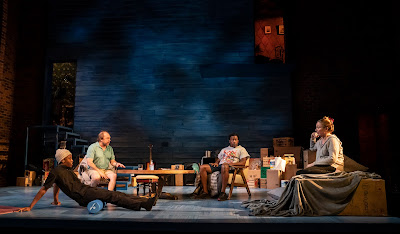Long Day's Journey Into Night (c) Joan Marcus
Theater: Long Day’s Journey Into Night
Audible at the Minetta Lane Theatre
Premise: If the subtle scattering of FedEx and Amazon boxes visible on Clint Ramos’ set for the Tyrone’s coastal summer house weren’t enough to tell you that this is a modern-day interpretation of Eugene O’Neill’s “Long Day’s Journey Into Night,” it’ll certainly be obvious when the play begins: Matriarch Mary (Elizabeth Marvel) is doing yoga when her husband, James (Bill Camp), replete with a Covid face mask, enters with Starbucks. Their sons, Jamie (Jason Bowen) and Edmund (Ato Blankson-Wood), soon enter the living room, and despite the cellphones and the modern set dressing and outfits, this is still the Tyrone family with secrets and resentments abound. James is still an actor, rich from playing the same part on stage he is known for, but his penny-pinching, especially when it comes to the family doctor, has resulted in youngest son Edmund’s dire health problems (in this production, it’s hinted that it’s Covid) as well as the drug addiction of his wife, which could be a result of over-prescription of painkillers after the difficult birth of Edmund two decades ago. And as the bright sun of the morning gives way to the fog creeping into the afternoon to the unbearable loneliness of night, the Tyrones must confront some truths or continue to live their days in this unending loop.
My Take: The first thing we hear from the staff at the Minetta Lane is that the production is an hour and 50 minutes with no intermission. While the usual running time of “Journey” can last over three and half hours, my interest was piqued by it’s almost swift running time. But with no intermission, the audience was also going to endure this massive drama with no reprise. Director Robert O’Hara has done a good job paring down the script, but his almost laser focus on Mary’s opioid addiction takes away from the drama. In most productions, Mary’s problem is only referenced, taking a backseat to the men of the household, until her story dominates the last act. This production’s shifting of the balance to Mary is a very modern take, but not a very illuminating one. This is no fault of the actors. Bowen and, especially, Blankson-Wood are strong as the sons particularly as drinks loosen their tongues and unpleasant truths are told. But it’s the performances of real-life married couple Marvel and Camp, two extraordinary actors whose instincts are always a little left of center, that keeps this production afloat, even if they are still a bit young to be playing these parts. That the parents are white and the sons are black are never commented on or used in any kind of racial commentary, so I just took it as color-blind casting. There’s a lot of audacious interpretations on display at the Audible Theater, but Eugene O’Neill’s journey seems less important than O’Hara’s vision. Your enjoyment of the production will depend on if you agree or not with the last statement. I will be interested to hear how this all plays out as a recorded audio drama, without all the modern visual touches.
VIP: Elizabeth Marvel. Robert O’Hara has upped Mary Tyrone’s role and Marvel is ready for it. Marvel, who I last saw as Goneril in Glenda Jackson’s Broadway “King Lear” and on Hulu as the mentally compromised mother in “Helstrom,” is heartbreaking as the lonely and neurotic wife. What is usually only heard as noise when Mary is upstairs, O’Hara leaves nothing to the imagination as to the depth of Mary’s addiction. And while I question this approach, Marvel goes all in to give the audience a horrible reality that is now no longer subtext.
If you want to comment on this review, please do so on my Instagram account. All reviews have their own post. And please follow to know when new reviews are released.
